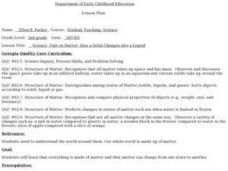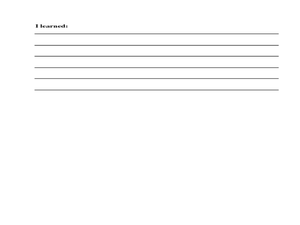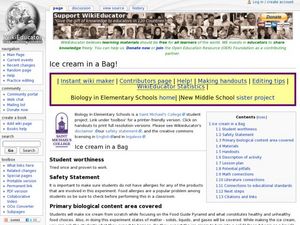National Endowment for the Humanities
Lesson 2: The Debate in Congress on the Sedition Act
Pupils research and discuss the provisions in the Constitution that supported the arguments for and against the Sedition Act. They articulate objections to and arguments in favor of the Sedition Act.
Curated OER
Gateway to America
Fifth graders study about immigration, Ellis Island, and tenement life from 1890 to 1924. They create an identity of a fictitious immigrant and describe what they find when they arrive in New York.
PBS
Looking for Lincoln Throughout His Life
Young historians gather information about Abraham Lincoln through a variety of activities. They match vocabulary words with pictures to create a timeline. Additionally, learners read books and articles that teach them...
Curated OER
How Transportation Transformed America
Eleventh graders focus on the role of transportation. In this transportation lesson, 11th graders look at the lives of Americans at the turn of the centuries. They compare and contrast 2000 to 1900.
Curated OER
The Interactive Periodic Table of the Elements
Pupils study the different types of metals. In this investigative lesson students watch a demonstration on the effects of temperature on atoms and take a tour through baone matter.
Curated OER
Water and Ice
Students explore the states of water. In this water states lesson, students observe ice over time and the changes that take place. Students read a related text and draw their observations in a journal entry. Students discuss the...
Curated OER
Starch and Sugar Testing 1
Eighth graders determine the presence of starch and sugar in unknown solutions. This task assesses students' abilities to observe, record and interpret data, classify, generalize/infer, construct data tables, and identify sugar and...
Curated OER
Temperature and Enzymes
Students compare the times it takes the milk in each of two cups to curdle. They are told that an enzyme that is added to the milk, rennin, is involved in the natural curdling process of milk. Students are asked to consider what...
Curated OER
Science: How Solids Become Liquids
Second graders discover how matter changes from one state to another by observing melting ice cubes. They decide on means to warm the ice and predict what will happen. Students record how long it takes for the cubes to melt.
Curated OER
Quarter Coin Cookies
Students study the historical figures and symbols of U.S.
patriotism depicted on the penny, nickel, dime, and quarter coins. They explore the processes involved in making coins, and how metals canchange in consistency from the...
Curated OER
Sound
Second graders study how sound is produced by vibrations and is transmitted through matter in all directions. They observe how sounds are produced and identify the ways in which sound travels.
Curated OER
The Same but Different Part II
Third graders experiment with beakers of water and balloons to measure the volume of the gas in the balloon. They determine ways to change the volume of air in the balloon which changes its size but not its physical state. By heating the...
Curated OER
Funny Putty
Students study that colloids are mixtures which display the properties of more than one of these states.
Curated OER
China: Land Beyond the Wall
An excellent series of five lessons on China awaits you and your young geographers. In these lessons, learners engage in hands-on activities, watch streamed video, access websites, and complete activities in cooperative groups in order...
Curated OER
Hey - It's a Rainy Forest Out There!
Elementary schoolers take part in a very good lesson which has them watch video, conduct experiments, complete hands-on activities, and work in cooperative groups. The educationally-rich activities are clearly-explained, and the group...
Curated OER
Density and Mass
Learners experiment to find which liquids are more dense. In this density and mass lesson, students predict and then test objects to observe and measure their density. learners observe which items sink and float. Students complete...
Curated OER
Water, Water Everywhere
Students explore water. In this water cycle lesson, students conduct a scientific investigation that requires build a terrarium models of the earth. Students record their observations of the changes regarding water in the terrarium.
Curated OER
What Does 'Post Racial' Mean, Anyway?
Eighth graders explore where they personally stand on a post-election continuum, spanning from euphoria to despair. In this American History lesson, 8th graders read and discuss an article immediately following the election and a...
Curated OER
Constitutional Convention
Eighth graders gain a greater understanding of the Constitutional Convention of 1787, and the issues surrounding the development of our Constitution. They participate in an activity and listen to lecture on the Convention, then search...
Curated OER
What Should Congress Do?
Eleventh graders explore the purpose of Congress. In this American Government lesson, 11th graders participate in a webquest about What Congress should do.
Curated OER
Myth-Conceptions
Young scholars examine the myths and misconceptions surrounding early European colonists in the New World. They analyze images, artwork, and media relating to the early colonists and discuss their accuracy.
Curated OER
Physical Changes of Water
Learners observe changes in water. In this lesson about water and its forms, students perform an experiment to determine how water changes. Learners analyze what causes water to be solid, liquid, or gas. Students record their...
Curated OER
Drinkable Snow
Learners explore snow. In this forms of water lesson, students read a story about snow, identify the types of snow found in Alaska, and learn Inuit words for snow. The lesson calls for an Intuit Elder to visit the classroom as a guest...























